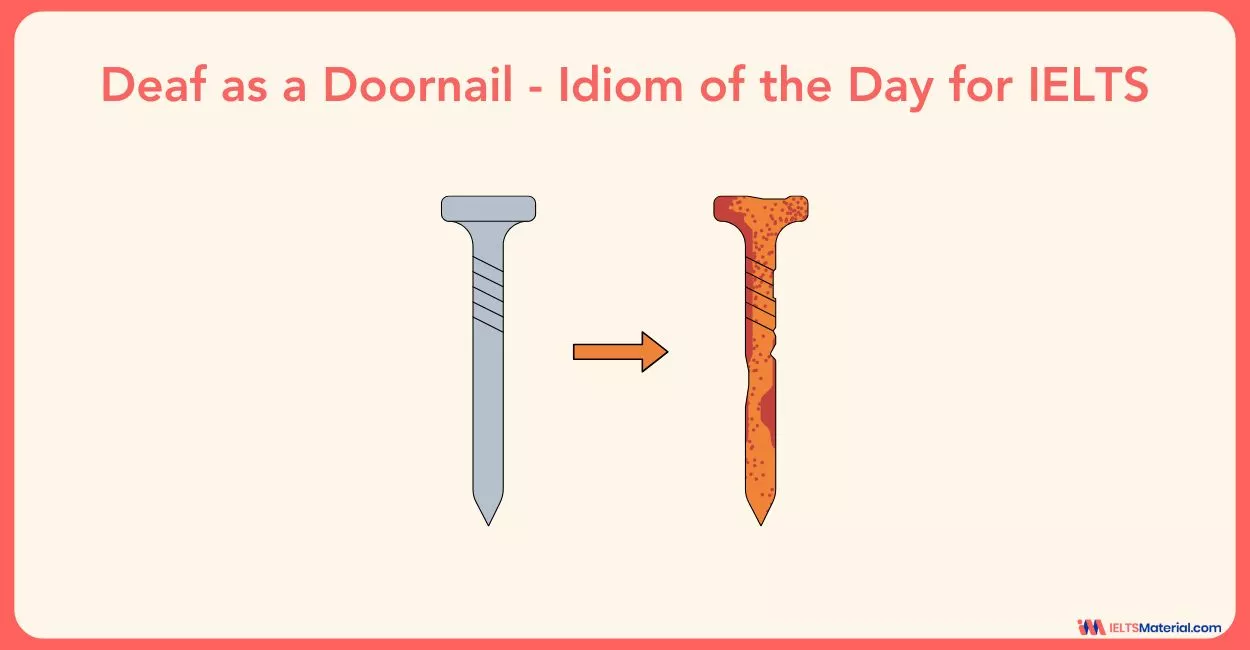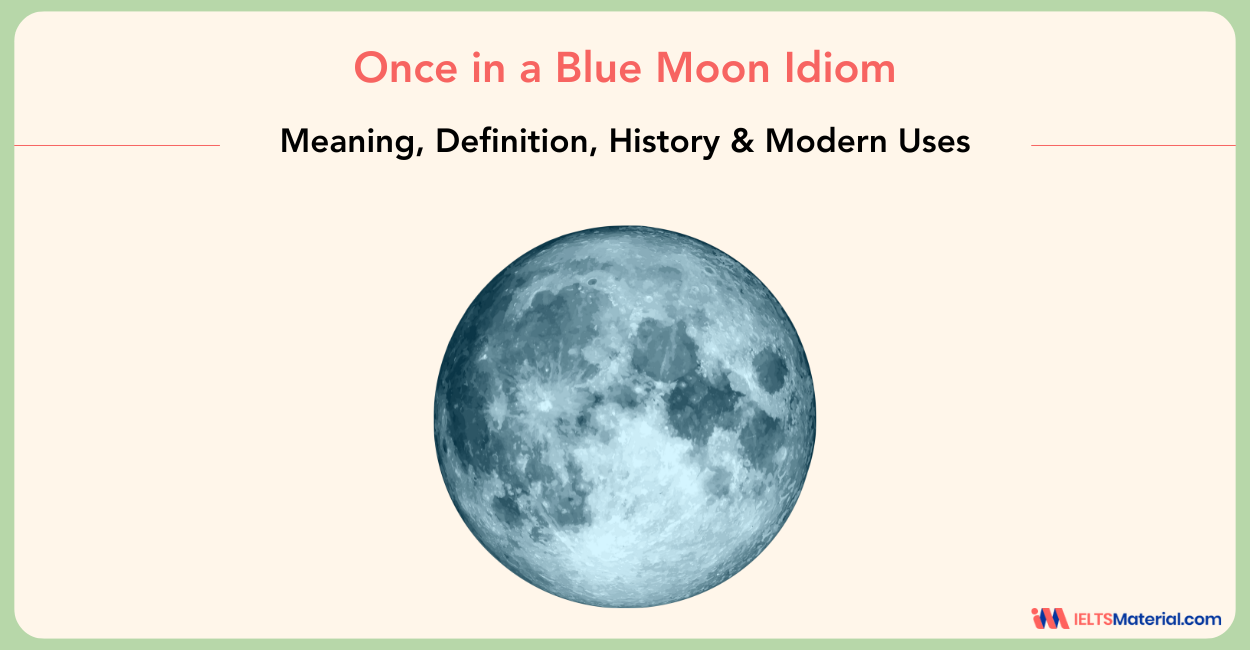Once in a Blue Moon Idiom: Meaning, Definition & Synonyms
Discover how to use the idiom “once in a blue moon” effectively in IELTS Speaking and Writing. Explore its meaning, origin, sample sentences, and practice exercises to sound more natural and fluent.
Table of Contents

Limited-Time Offer : Access a FREE 10-Day IELTS Study Plan!
The idiom “once in a blue moon” refers to something that happens very rarely. In the context of the IELTS exam, especially in IELTS Speaking and IELTS Writing Task 1 (General Training), the use of idiomatic expressions like this can enhance the natural tone of your responses. Idioms showcase your grasp of informal English and cultural nuances, which can help you achieve an IELTS band score of 7 and above for lexical resource.
For example:
- In IELTS General Writing Task 1: “I visit my grandparents once in a blue moon due to my hectic work schedule.”
- In IELTS Speaking Part 1: “I go hiking once in a blue moon, but I absolutely enjoy it when I do.”
Using idioms appropriately helps your speech sound more fluent and expressive—two traits that impress IELTS examiners.
Once in a Blue Moon Idiom: Definition & Meaning
The simplest meaning of “once in a blue moon” is: “Very rarely.” The phrase implies that something happens so seldom that it’s as rare as a blue moon, which is an uncommon lunar phenomenon. When you say something happens “once in a blue moon,” you’re highlighting its rarity and infrequency.
It is used to describe actions or events that occur infrequently. For instance: “He cooks dinner once in a blue moon, so it’s always a surprise!”
Once in a Blue Moon Idiom: History & Origins
The idiom dates back to the 16th century. Originally, the phrase “blue moon” had nothing to do with color. In astronomy, most years have 12 full moons—one per month. But every 2.5 to 3 years, a 13th full moon appears in a year. This extra moon is called a “blue moon.” The earliest metaphorical use of “blue moon” was recorded in 1837, describing something unbelievably rare or absurd—similar to saying, "when pigs fly."
Over time, “once in a blue moon” became a fixed expression in the English language, now meaning extremely rare occurrences.
Check out the Useful Idioms for IELTS Speaking to Score Band 8.0+
Once in a Blue Moon Idiom: Modern Usage
Nowadays, the idioms like “once in a blue moon” remain popular in spoken English, particularly in informal conversations and storytelling. This idiom is especially relevant for IELTS Speaking part 1, IELTS Speaking part 2, and 3, where examiners assess your range and flexibility of vocabulary.
Here are some modern-day usage examples:
- “I order takeout once in a blue moon because I usually prefer cooking.”
- “My uncle visits from abroad once in a blue moon, so we make the most of it.”
- “Our local museum hosts an international exhibit once in a blue moon.”
- “I go to music festivals once in a blue moon, but I love the energy when I do.”
- “He cleans his car once in a blue moon, and it shows!”
Tip for IELTS Candidates: Use idioms only when they fit the tone and context of your response. Don’t force them into formal writing tasks like IELTS Writing Task 2.
Once in a Blue Moon Idiom: Fun Fact
Did you know? A blue moon doesn’t actually appear blue. In modern astronomy, it refers to:
- The second full moon in a calendar month
- OR the third full moon in a season with four full moons
This occurs approximately every 2.7 years. Although extremely rare, certain atmospheric conditions like volcanic ash can make the moon appear blue—hence the origin of the term.
Boost your IELTS band score with formal idioms—sign up for our expert-led IELTS online classes today!
Once in a Blue Moon Idiom: Practice Exercise
Here are some multiple-choice questions related to the idiom “once in a blue moon”
1. Which of the following is the closest meaning of the idiom “once in a blue moon”?
A. Happens every day
B. Happens once in a while
C. Happens very rarely
D. Happens never
2. Which of the following sentences uses the idiom “once in a blue moon” correctly?
A. I see my grandmother once in a blue moon.
B. I only get to eat pizza once in a blue moon.
C. I get to travel once in a blue moon.
D. I only get to go to the movies once in a blue moon.
3. Fill in the blank with the correct idiom: I only get to see my best friend ________.
A. once in a while
B. once in a blue moon
C. every day
D. once in a month
4. Which of the following is an example of something that happens once in a blue moon?
A. A solar eclipse
B. A full moon
C. A lunar eclipse
D. A meteor shower
5. Which of the following sentences is the most similar in meaning to “I only get to see my aunt once in a blue moon”?
A. I see my aunt every other week.
B. I see my aunt every few months.
C. I see my aunt every year or so.
D. I see my aunt once in a lifetime.
Tired of scrolling through the list of common idioms for IELTS Speaking? Download useful idioms for IELTS Speaking PDF for 100 such idioms
Answer Key
- The answer is (C). The idiom “once in a blue moon” means something that happens very rarely or infrequently. A blue moon is a full moon that occurs once in every 2.7 years, which is much less often than a regular full moon. So, option (C) is the closest meaning of the idiom.
- The answer is (A). The sentence “I see my grandmother once in a blue moon” uses the idiom correctly to mean that the speaker only gets to see their grandmother very rarely. The other sentences do not use the idiom correctly.
- The answer is (B). The idiom “once in a blue moon” is the best choice to fill in the blank because it means that the speaker only gets to see their best friend very rarely. The other options do not make sense in the context of the sentence.
- The answer is (A). A solar eclipse is a rare event that occurs when the moon passes between the Earth and the sun. It only happens once every 18 months or so. The other options are not as rare as a solar eclipse.
- The answer is (C). The sentence “I see my aunt every year or so” is the most similar in meaning to “I only get to see my aunt once in a blue moon” because it means that the speaker only gets to see their aunt very rarely. The other options do not make sense in the context of the sentence.
Why Idioms Matter in IELTS Speaking & Writing?
The IELTS band descriptors still place strong emphasis on:
- Lexical resource
- Coherence and fluency
Using idioms can:
- Make your answers sound more natural and expressive
- Help convey emotions and nuanced meaning
- Show your cultural awareness and linguistic flexibility
However, overuse or incorrect usage can reduce clarity and affect your score. So, it’s best to use idioms sparingly and appropriately, particularly in Speaking and General Writing Task 1 (informal letters).
Trying hard to achieve the magical figure of 8777 in IELTS? Talk To our Experts in Our Live Webinar
Conclusion
The idiom “once in a blue moon” is not just a poetic expression, it’s a valuable tool in your IELTS vocabulary arsenal. When used correctly, it helps you stand out from other candidates by demonstrating fluency, creativity, and a nuanced understanding of English. As you prepare for the IELTS Speaking or Writing sections, make sure to:
- Understand idioms in context
- Practice them in natural sentences
- Use them appropriately based on task type
Need a comprehensive IELTS resource on vocabulary? Don’t Miss out on Vocabulary for IELTS!
Remember, idioms like “once in a blue moon” can give your language a touch of authenticity and charm—just don’t overdo it!
Also Check:
- ‘As Cool As A Cucumber’ Idiom: Meaning, Origin, Evolution & Exercise!
- A Dime A Dozen Idiom: Meaning, Origin, Evolution & Exercise!
- ‘Bob’s Your Uncle’ Idiom: Meaning, Origin, Evolution & Exercise
- The Sky is the Limit Idiom – Meaning, Definition & Synonyms
- Chew the Fat Idiom – Meaning, Definition & Synonyms
Explore IELTS Resources

Start Preparing for IELTS: Get Your 10-Day Study Plan Today!
Recent Articles

Kasturika Samanta

Prity Mallick

Nehasri Ravishenbagam

Kasturika Samanta




Post your Comments